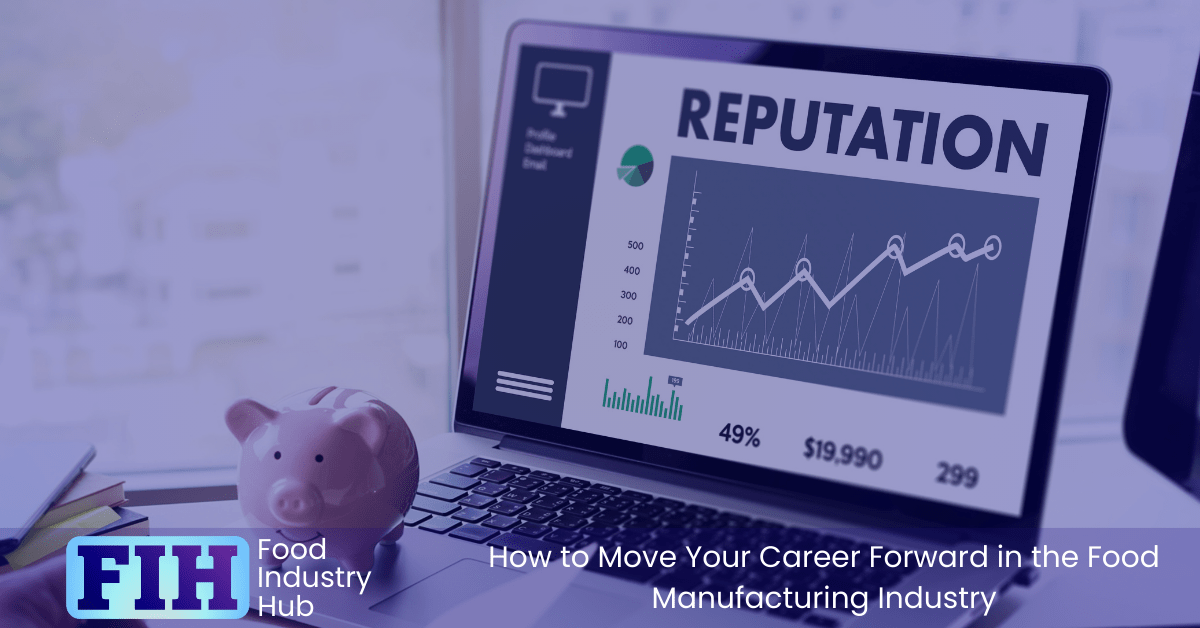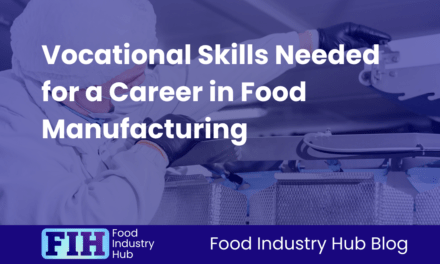Introduction
To progress in the food manufacturing industry, you have to be proactive in seeking growth opportunities, building a strong network, and showcasing your reliability through extra responsibilities. By focusing on continuous improvement and positioning yourself as a valuable team member, you can pave the way for career advancement. But there’s more to it than just these steps; let’s explore some additional strategies that can set you apart and propel your success in this competitive field.
This post is part of a collection we’ve put together to explore the topic of professional success, and you can explore the topic in more detail by browsing the related content.
Table of Contents
Key Takeaways
- Embrace continuous learning and skill development.
- Seek opportunities to streamline processes and innovate.
- Build strong professional relationships and networks.
- Demonstrate reliability, integrity, and impactful contributions.
- Establish a personal brand showcasing expertise and passion.

Act With Integrity
To succeed in the food industry, always act with integrity in your interactions and decision-making. Integrity forms the foundation of trust in any workplace.
When faced with ethical dilemmas, consider the long-term consequences of your choices. Upholding honesty and transparency will help you to build a reputation for reliability and dependability.
In your daily tasks, demonstrate integrity by honouring commitments, admitting mistakes, and seeking feedback for improvement. Your colleagues will value your honesty and authenticity.
When making decisions, hold ethical considerations above short-term personal gain. Integrity often means taking the harder path, but it ultimately leads to respect and credibility among peers and supervisors.
Remember that integrity isn’t just about following rules but doing what’s right. Act with consistency, fairness, and respect towards others.

Avoid Gossip and Office Politics
Steer clear of engaging in gossip and office politics to maintain a professional and respectful work environment. While it may be tempting to participate in office chatter or alliances, getting caught up in gossip can damage your reputation and hinder your career growth. Remember, what goes around comes around, and being known as someone who spreads rumours or plays office politics can lead to strained relationships and lost trust among colleagues.
Instead, focus on building genuine connections based on trust and mutual respect. Be mindful of the conversations you engage in and ensure they contribute positively to the work environment.
If you find yourself in a situation where gossip or office politics are prevalent, gracefully excuse yourself from those discussions and redirect the conversation towards more productive topics.

Sign-up for the Food Industry Hub Mail Service
We regularly produce new content for food industry professionals, and the Food Industry Hub Mail Service is the best way to stay up to date with the latest additions.
Signup today to be added to the Food Industry Hub mailing list.
Bring Your Authentic Self
Embrace who you are and let your genuine personality shine through in your interactions with colleagues. Being authentic not only helps you build trust and stronger relationships but also enables you to shine for your own unique strengths.
When you bring your true self to work, you’re more likely to feel fulfilled and engaged in your tasks. Authenticity breeds confidence, and when you’re confident in who you are, others are more likely to respect and value your contributions.

Persistently Pursue Self-Improvement
Make continuous self-improvement a priority in your journey towards advancing your career in the food manufacturing industry. Embrace a growth mindset that values learning and development. Seek out opportunities to expand your knowledge and skills, whether through industry workshops, online courses, or mentorship programs. Stay curious and open to new ideas, as the food industry is constantly evolving.
Set specific goals for your self-improvement efforts. Identify areas where you can enhance your expertise, such as familiarity with food safety regulations, quality control methods, or sustainability practices. Break down these goals into manageable steps and track your progress along the way. Celebrate your achievements, no matter how small, to stay motivated and engaged in the process.
Remember that self-improvement is a continuous journey, not a destination. Stay committed to your growth and be willing to adapt to change. By persistently pursuing self-improvement, you’ll not only enhance your skills and knowledge but also demonstrate to your colleagues and superiors your dedication to personal and professional development.

Develop a Reputation for Reliability
Fostering a reputation for reliability requires consistent follow-through on your commitments and responsibilities. Being reliable means more than just showing up on time; it means being someone others can count on to get the job done efficiently and effectively.
To develop this reputation, focus on meeting deadlines, communicating openly and honestly, and being proactive in addressing any challenges that may arise.
Building reliability starts with small actions. Make it a habit to always deliver quality work, even on tasks that may seem insignificant. By consistently demonstrating your reliability in these smaller ways, you build trust with your colleagues and supervisors.
Remember, your reputation for reliability is like a valuable currency in the workplace – it can open doors to new opportunities and projects.
Take ownership of your mistakes and learn from them. Acknowledging when things go wrong and taking steps to rectify the situation shows integrity and a commitment to improvement.

Focus on Delivering Impact
To excel in the food industry, prioritise delivering tangible impact through your actions and decisions.
Focus on identifying areas where you can make a difference and then take proactive steps to implement changes that bring about real results.
Whether it’s streamlining production processes to increase efficiency, introducing cost-saving measures without compromising quality, or spearheading initiatives to improve product sustainability, each action you take should be aimed at creating a noticeable impact within your organisation.

Build Excellent Communication Skills
As you focus on delivering impact in the food manufacturing industry, cultivating excellent communication skills can significantly enhance your ability to drive positive change and build strong relationships within your organisation. Clear and effective communication is crucial in conveying your ideas, aligning team efforts, and fostering collaboration.
To excel in food manufacturing, honing your communication skills won’t only help you articulate your vision but also ensure that your message is understood by diverse stakeholders.
Active listening is a cornerstone of effective communication. By truly understanding the perspectives of your colleagues, you can tailor your approach to resonate with their needs and concerns. Moreover, being able to express your thoughts persuasively and diplomatically can help you navigate conflicts and negotiations with grace.

Learn How to Persuade Others
Developing the ability to effectively persuade others is a valuable skill that can greatly impact your success. Being able to persuade colleagues, clients, or superiors can help you advance your ideas, projects, and career.
To become a more persuasive communicator, start by understanding the needs and motivations of the individuals you’re trying to persuade. Tailoring your message to align with their interests can make your arguments more compelling.
Practice active listening to better grasp their concerns and viewpoints. This will allow you to address them directly and build trust.
When presenting your ideas, focus on highlighting the benefits and potential outcomes, showing how they align with the goals of the organisation or team.
Remember to use storytelling and concrete examples to make your points more relatable and memorable.
Be open to feedback and willing to adjust your approach based on the reactions you receive. Developing strong persuasion skills can enhance your influence and help you achieve your career goals in the food manufacturing industry.

Intentionally Work on Your Personal Brand
Crafting a distinct personal brand is crucial for making a lasting impression and standing out. To intentionally work on your personal brand, start by identifying your unique strengths, values, and passions. Consider how you want to be perceived by colleagues, superiors, and potential employers. Develop a clear and consistent online presence through platforms like LinkedIn, showcasing your expertise and accomplishments in the industry.
Networking plays a vital role in building your personal brand. Attend industry events, engage with professionals online, and seek mentorship opportunities. By connecting with others in the field, you can gain valuable insights, expand your knowledge, and increase your visibility within the industry.
Remember to consistently demonstrate your expertise and professionalism in all interactions. Whether it’s through your communication style, work ethic, or problem-solving skills, let your personal brand shine through in everything you do. By investing time and effort into cultivating a strong personal brand, you can enhance your career prospects and unlock new opportunities.

Nurture Your Professional Relationships
Fostering and nurturing your professional relationships is key to advancing your career trajectory. Building strong connections with colleagues, supervisors, clients, and industry leaders can open doors to new opportunities, mentorship, and valuable insights.
Take the time to engage in meaningful conversations, show genuine interest in others’ work, and offer your support whenever possible.
Networking events, industry conferences, and even social media platforms can serve as avenues to expand your professional circle. Remember, it’s not just about making connections but also about maintaining them. Follow up with contacts, express gratitude, and seek ways to contribute to their success.
Don’t underestimate the power of a good reputation. Being known as a reliable, collaborative, and respectful professional can significantly impact how others perceive you and the opportunities that come your way.

Pay Attention to The Quality of Your Work
Make sure you can always be proud of the quality of your work to build credibility and achieve long-term success. Your commitment to producing high-quality outputs reflects not only on you but also on the reputation of the company you work for.
Consistently delivering work that meets or exceeds standards showcases your dedication and attention to detail, setting you apart as a reliable and valued team member.
To maintain quality in your work, prioritise precision in every task you undertake. Double-check measurements, check details meticulously, and adhere to procedures and guidelines without cutting corners.
Take pride in what you produce, knowing that each item leaving your hands carries your stamp of quality.

Volunteer For Extra Responsibilities
Taking on additional responsibilities voluntarily can significantly enhance your professional growth and visibility within the food industry. By proactively seeking out new tasks or projects, you demonstrate initiative and a willingness to go above and beyond your current role. This not only showcases your capabilities but also highlights your commitment to the success of the team and the organisation as a whole.
Volunteering for extra responsibilities can provide you with valuable opportunities to learn new skills, expand your knowledge base, and demonstrate your versatility. It can also help you build relationships with colleagues from different departments and levels within the company, increasing your visibility and networking opportunities.
When volunteering for extra responsibilities, make sure to communicate your intentions clearly, manage your time effectively, and deliver results consistently. This won’t only showcase your reliability but also position you as a proactive and valuable asset within your organisation.

Join Teams and Working Groups to Expand the Significance of Your Role
By actively engaging with teams and working groups, you can elevate the impact of your role within your business and further broaden your professional reach. Joining these collaborative efforts allows you to contribute your unique skills and insights while also learning from others in diverse roles.
By participating in teams focused on innovation, quality control, or sustainability, you can showcase your expertise, build relationships, and gain a deeper understanding of the industry. Working groups provide a platform to address challenges collectively, share best practices, and drive positive impact within your organisation.
Being part of these teams not only enhances your visibility within the company but also demonstrates your commitment to continuous improvement and teamwork. It’s an opportunity to showcase your leadership potential, problem-solving abilities, and collaborative spirit. Participating in cross-functional teams exposes you to different perspectives, helping you develop a more holistic approach to your work.

Develop Excellent Technical Competency
Focus on honing your technical skills to develop excellent competency in your field. Embrace opportunities to learn about new technologies, machinery, and processes within the industry. Take the initiative to attend workshops, seminars, and training sessions to stay updated on the latest advancements.
By continuously expanding your technical knowledge, you won’t only become a valuable asset to your current role but also position yourself for career growth. Practice hands-on experience whenever possible to solidify your understanding of technical concepts. Seek out mentorship from experienced professionals in your field to gain insights and practical tips.
Don’t be afraid to ask questions or seek clarification when facing challenges – this shows your dedication to mastering your craft. Remember, technical competency is a key differentiator in the food manufacturing industry, so investing time and effort into enhancing your skills will set you apart from your peers and propel your career forward.

Track Your Professional Accomplishments
Stay proactive in documenting and tracking your professional accomplishments to showcase your value and progress. Keeping a record of your achievements not only helps you recognise your growth but also provides concrete evidence of your capabilities.
Create a system, whether digital or physical, where you can log completed projects, successful initiatives, and any accolades received.
When tracking your accomplishments, focus on quantifiable results whenever possible. Numbers and percentages can add significant weight to your achievements, demonstrating the impact you’ve had on the company’s success. Don’t forget to include any new skills acquired, certifications earned, or training programs completed.
Regularly review and update your accomplishments to ensure they’re current and relevant. This will come in handy during performance evaluations, salary negotiations, or when seeking new opportunities within the industry.
In Summary
As you navigate your career in the food manufacturing industry, remember to always act with integrity and avoid office politics.
Bring your authentic self to work, persistently pursue self-improvement, and develop a reputation for reliability.
Volunteer for extra responsibilities, join teams and working groups, and continually develop your technical competency.
By tracking your professional accomplishments and positioning yourself as a proactive asset, you’ll be well on your way to moving your career forward in this dynamic industry.

Further Resources
Food Industry Hub serves the food industry with a range of digital resources for the benefit of both commercial food manufacturers and food industry professionals.
For food manufacturers, we offer integrated management systems that give every user a direct interface with your QMS.
For food industry professionals, we provide an extensive signposting service in addition to informational content we hope you’ll find useful as you face new professional challenges. We have very ambitious plans to expand the range of services offered, and currently present informational content on management, safety and quality, food safety and quality culture, and professional success.














